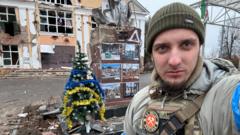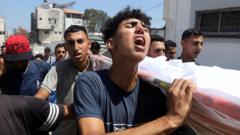### Summary: In a candid account, Ukrainian soldiers detail the chaotic retreat from Russian-held Sudzha, highlighting frustrations with communication failures and the complexities of cross-border raids. Several military personnel reflect on the implications of peace negotiations led by Western powers and their impact on Ukraine's sovereignty.
### Title: Ukrainian Soldiers Share Insights on Chaotic Retreat from Russian Territory

### Title: Ukrainian Soldiers Share Insights on Chaotic Retreat from Russian Territory
### Description: Artem Kariakin and fellow soldiers reveal their experiences during Ukraine's tumultuous withdrawal from Russia's Kursk region amidst ongoing conflict.
Artem Kariakin and his unit had been making frequent incursions into the Russian town of Sudzha just over a week ago. Documenting their final retreat from the Kursk region, Artem captures the chaos through footage from their mobile phone. The scene reveals deserted vehicles, both military and civilian, engulfed in flames as they navigate a perilous route. While a soldier guards against incoming drones, they narrowly escape an explosive attack.
Artem, a 27-year-old soldier, describes the pullout from Sudzha as "not well organized" and "pretty chaotic." He points to the lack of communication as a major hurdle, as the reliable Starlink systems failed inside Russian borders. Nevertheless, he views the operation as a tactical success that compelled Russia to refocus its military resources.
The Ukrainian offensive launched in August 2024 appeared to catch Russian forces off-guard, yet Artem believes it was overly ambitious—stretching too far with inadequate supply lines. As he and his comrades are forced to retreat, global leaders including US President Donald Trump and Russian President Vladimir Putin discuss potential resolutions to the ongoing war. Artem expresses disbelief at their negotiations, voicing skepticism over the motives behind such calls.
Coming from the currently occupied Luhansk region, Artem is disheartened by what he perceives as a lack of commitment from the US towards Ukraine's territorial integrity. He fears that compromises suggested in these talks could lead to the loss of his home.
Despite their withdrawal, Ukrainian forces continue to launch cross-border missions into both Kursk and Belgorod. Serhiy, another soldier engaged in these operations, describes the planning involved in navigating Russian defenses to retrieve damaged military vehicles under the cover of darkness. Having been born in Russia but fighting for Ukraine, he emphasizes the necessity of these incursions as a defensive strategy.
As Serhiy embarks on repairing a downed US-made Bradley vehicle, he notes the precarious balance of threats near the border. Concerns about drone warfare and other advanced weaponry loom large, but his determination to reclaim their equipment remains resolute.
The realities of the Ukrainian military landscape highlight a heavy dependence on US support, a reliance that feels increasingly uncertain amidst evolving diplomatic dialogues. Serhiy warns that should American backing wane, any resulting ceasefire could favor Russian terms. He urges that Europe, while crucial, cannot single-handedly ensure Ukraine’s security.
Desiring an end to the conflict, Serhiy, like many Ukrainians, is adamant that peace cannot come at the expense of their sovereignty. The soldiers' experiences encapsulate not only their current struggles but also the broader implications of international discussions taking place far from the battlefield.





















